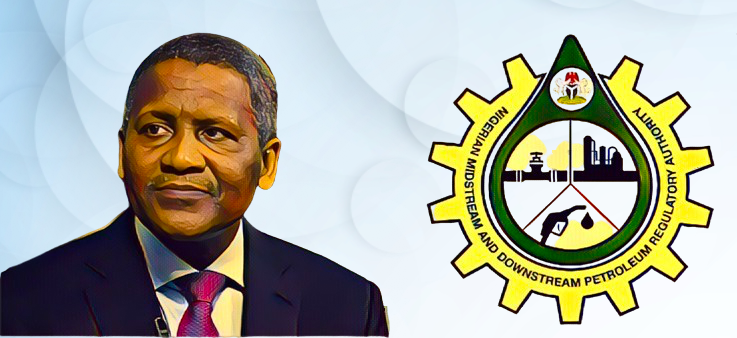Nigeria’s oil and gas industry faces increased risk and potential disruption due to a growing dispute between Dangote Industries Limited and the Nigerian Midstream and Downstream Petroleum Regulatory Agency (NMDPRA). The disagreement centers around the quality of diesel produced by the Dangote refinery, a key facility on the outskirts of Lagos.
The $20 billion Dangote refinery, once fully operational, is expected to process up to half of Nigeria’s daily oil output. This development was anticipated as a major boost for the country’s industrial landscape. However, recent allegations from NMDPRA have cast a shadow over what should be a landmark achievement.
According to NMDPRA, the diesel produced by the Dangote refinery contains a high level of sulfur—about 1,000 parts per million. This is significantly higher than the sulfur content in imported diesel. The regulator’s comments have sparked concerns about the refinery’s operational standards and raised questions about its future role in Nigeria’s energy sector.
A senior source within Nigeria’s oil and gas sector emphasized the importance of the refinery. “The Dangote refinery contributes to our GDP, reduces dependency on imports, and alleviates pressure on our foreign exchange reserves. Above all, it creates numerous jobs,” the source told BusinessDay. The source also accused some individuals of trying to sabotage the refinery for their own gain, suggesting that corrupt elements within the government may be working to undermine this crucial project.
This situation is particularly striking given the favorable relationship that Dangote Industries had with former President Muhammadu Buhari. The public disagreement with the current administration’s regulatory body represents a significant shift. On Thursday, Farouk Ahmed, the CEO of NMDPRA, declared that the Federal Government would continue to allow the importation of petroleum products. He stated that Nigeria cannot rely solely on the Dangote refinery to meet the nation’s fuel needs.
The NMDPRA’s stance has drawn criticism from various quarters. Luqman Agboola, head of energy and infrastructure at Sofidia Capital, noted that regulatory uncertainty is a significant deterrent for investment in the oil and gas sector. “Such uncertainty hampers business operations and increases production costs. It affects competition and reduces profitability,” Agboola explained. He warned that any factor affecting foreign investment could have a severe impact on Nigeria’s oil sector and potentially result in lost opportunities for major energy deals.
Juwon Adebayo, an energy and environmental lawyer at the Center for Energy Resources Consulting, also highlighted the risks posed by regulatory and political instability. “Investors in the oil and gas sector face real challenges from regulatory and political risks. They conduct extensive due diligence to address or reduce these risks before making investments,” Adebayo said.
Charles Ogbeide, an energy analyst with a Lagos-based investment bank, criticized the NMDPRA’s comments as reckless. He pointed out that the Dangote refinery is still in stages of completion and commissioning. “The refinery is producing diesel, and it is normal for the sulfur levels to be higher during this phase,” Ogbeide said. He suggested that the NMDPRA’s statements may be driven by personal grievances rather than technical assessments.
Kelvin Emmanuel, an energy economist and board member at Obsidian Archenar Nigeria, provided additional context on the refinery’s testing process. He explained that NMDPRA officials have been monitoring the refinery’s systems for 12 months, conducting both mechanical and electrical checks. After six months of wet production testing, the refinery receives a provisional acceptance certificate, followed by a final acceptance certificate after 12 months. Emmanuel noted that the refinery is not yet operating at full capacity, which explains the current sulfur levels in the diesel. He criticized the NMDPRA’s actions as misleading and damaging to the refinery’s reputation.
Jide Pratt, country manager at Trade Grid and an energy analyst, questioned the regulator’s consistency. “The same agency that issued a waiver now claims that the refinery’s products are inferior. Why did they allow sales into the open market if they had concerns?” Pratt asked. He highlighted inconsistencies in regulatory oversight and called for the government to address anomalies in the sector.
The Dangote Group, valued at over $15 billion, has long enjoyed strong relationships with Nigerian leaders. Dangote is seen as a champion of domestic industry, being the largest employer outside the Federal Government and one of Nigeria’s top taxpayers. However, recent events have put this relationship under strain.
In May 2023, President Bola Tinubu appointed a special investigator to review the tenure of Godwin Emefiele, former governor of the Central Bank of Nigeria (CBN). The investigation revealed allegations that Emefiele’s multiple exchange rate system disproportionately benefited certain industries. Emefiele, who was removed from his position in June 2023, has denied these allegations. The investigation has heightened scrutiny of the Dangote Group, with claims that the company benefited from favorable foreign exchange allocations under Emefiele’s regime.
The EFCC has requested documents from 52 companies regarding their forex allocations since 2014, but only Dangote’s enterprise has faced public scrutiny related to the probe. The Dangote Group has denied any wrongdoing and expressed surprise at the focus on its operations.


